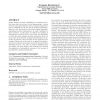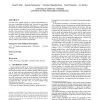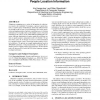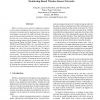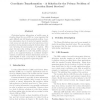MSWIM
2003
ACM
14 years 8 months ago
2003
ACM
Mobile Ad-Hoc Networks (MANETS) are networks of mobile nodes that do not have a fixed infrastructure. Recent research in this field addresses ways of solving existing problems i...
MSWIM
2003
ACM
14 years 8 months ago
2003
ACM
Recently, geographic routing in wireless networks has gained attention due to several advantages of location information. Location information eliminates the necessity to set up a...
MOBICOM
2003
ACM
14 years 8 months ago
2003
ACM
For many years, scalable routing for wireless communication systems was a compelling but elusive goal. Recently, several routing algorithms that exploit geographic information (e....
SAINT
2003
IEEE
14 years 8 months ago
2003
IEEE
The content of the world-wide web is pervaded by information of a geographical or spatial nature, particularly such location information as addresses, postal codes, and telephone ...
SACMAT
2004
ACM
14 years 8 months ago
2004
ACM
Ubiquitous computing uses a variety of information for which access needs to be controlled. For instance, a person’s current location is a sensitive piece of information, which ...
MUM
2005
ACM
14 years 8 months ago
2005
ACM
Location information is becoming increasingly important in many pervasive computing applications. Reliance on accurate local knowledge of location is often critical to providing e...
MSWIM
2005
ACM
14 years 8 months ago
2005
ACM
In this paper, we consider the security of geographical forwarding (GF) – a class of algorithms widely used in ad hoc and sensor networks. In GF, neighbors exchange their locati...
IPPS
2006
IEEE
14 years 9 months ago
2006
IEEE
While a wireless sensor network is deployed to monitor certain events and pinpoint their locations, the location information is intended only for legitimate users. However, an eav...
IPPS
2006
IEEE
14 years 9 months ago
2006
IEEE
Protecting location information of mobile users in Location Based Services (LBS) is a very important but quite difficult and still largely unsolved problem. Location information h...
GLOBECOM
2008
IEEE
14 years 9 months ago
2008
IEEE
Abstract—We consider the location service in a mobile adhoc network (MANET), where each node needs to maintain its location information in the network by (i) frequently updating ...
